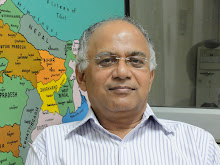BEAUTY CELEBRITY from Don Bosco -ROBERT NAOREM - BOSCONET THOUGHTS
Robert Naorem, 28, is a true celebrity – a top beauty expert of India. His skills are in great demand for films, fashion shows, beauty pageants like Femina Miss India, Cheerleaders of IPL cricket teams, Brand Promotion of various products, artists, models …
He did his schooling at Don Bosco, Imphal, Manipur. A silent guy, yet very bright, Robert’s taste for beauty developed into skills for creating beauty.
In 2008 he established the Robert Academy at Bangalore for make-up training. His two dreams are to showcase the beauty of typical Manipur costumes to the outside world and to promote youngsters interested in the fashion industry.
He keeps growing. He is currently doing a PhD course to crown the M.Phil. in Psychology he already has. He lectures part time in CMR College, Bangalore, and in NIFT (National Institute of Fashion Technology), Bangalore.
Don Bosco is glad to see Robert’s progress. He has reason to be proud. He has made us proud. Congratulations!
Check out our FB page – BosconetIndia (and, “LIKE” it !)
